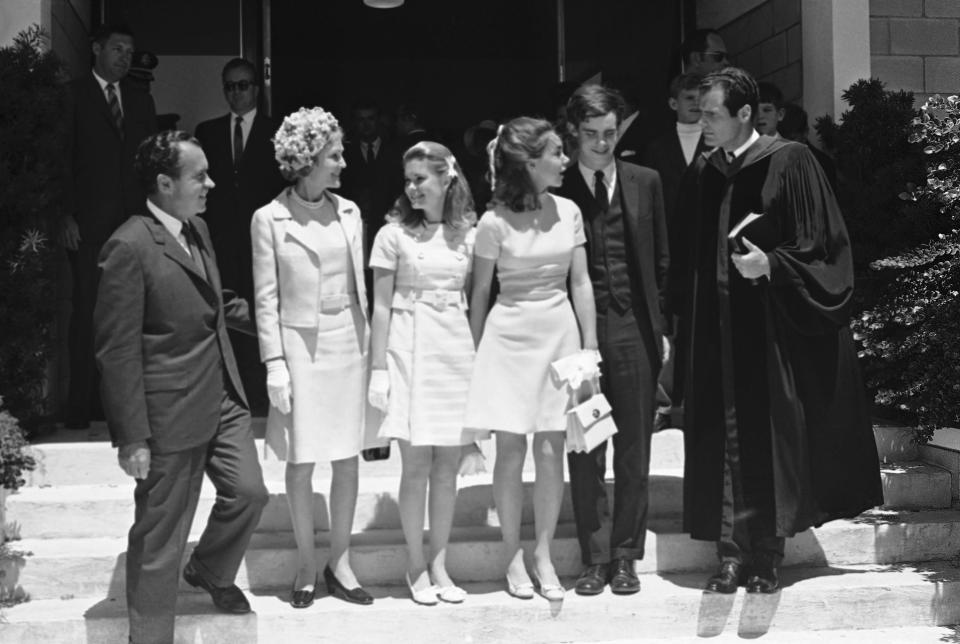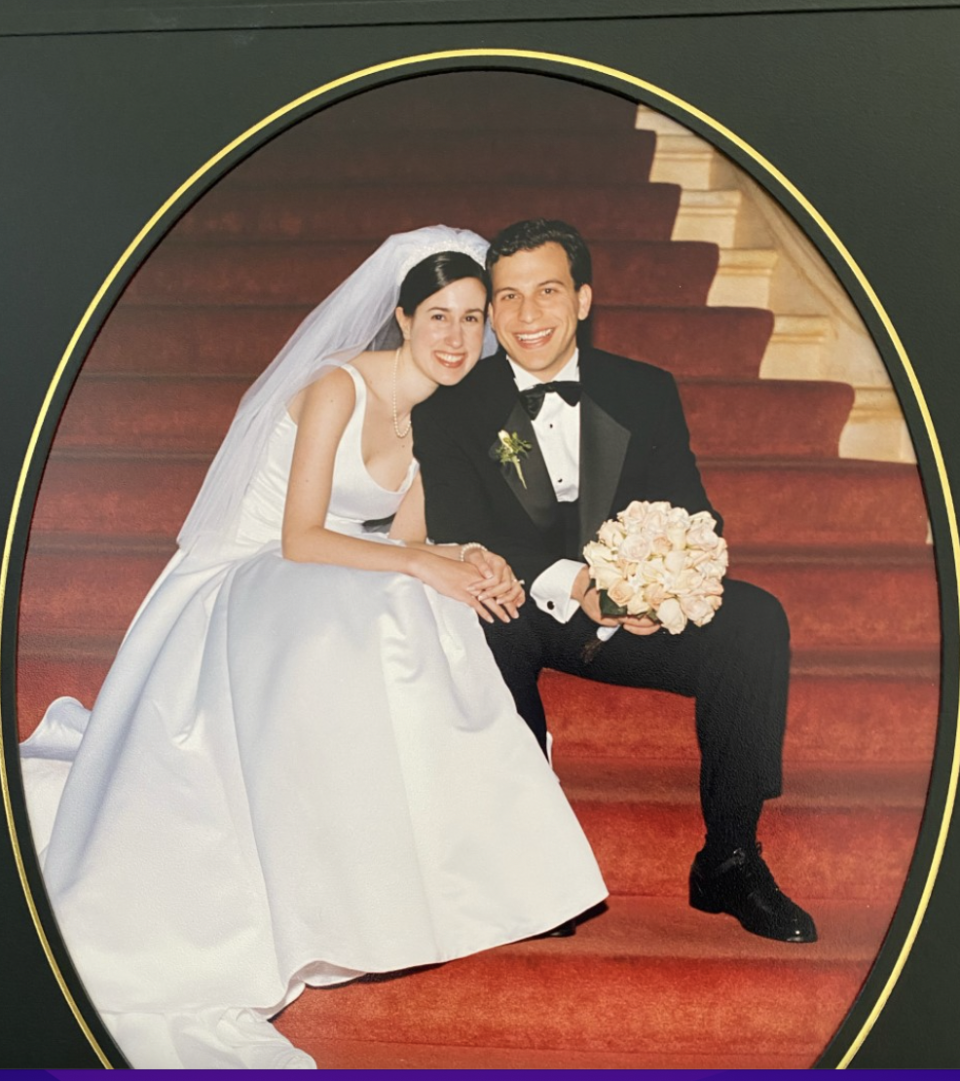The vexing problem of what to call your in-laws: Mom and Dad? By their first names?
- Oops!Something went wrong.Please try again later.
- Oops!Something went wrong.Please try again later.
When Frances Gardner got married 60 years ago, her new mother-in-law made it perfectly clear they would not be on a first-name basis.

She said to call her “Mom,” recalled Gardner, 76, a retired Louisville schoolteacher.
Isaac McDaniel, a Roman Catholic priest who teaches at Bellarmine University, said his parents called both sets of in-laws “Mr. and Mrs.”
But when he recently asked students in a senior seminar what their parents called their own in-laws, they all said by their first names.
It is the elephant in the room for newlyweds – what to call their spouse’s parents – and it only adds to the stresses of the first year of marriage, counselors and clergy say.
Some people − including this reporter − never address the sticky subject and call their in-laws nothing, sometimes for decades.
Others are stuck in limbo until they have their own children, who come up with their own nicknames for their grands, which their parents then adopt.
Louisville attorney Brian Butler, for instance, calls his father-in-law "Bop Bop," borrowing the nickname from his son, although the white-collar defense lawyer calls his mother-in-law “Wee,” on account of her diminutive size.
“She likes it,” he insists.
More:For American Jews, Christmas is for Chinese food, movies and reflection on being different
According to a YouGov poll of Americans in July, 29% of couples call their in-laws by their first names (including Louisville Mayor-elect Craig Greenberg and his wife, Rachel), 17% refer to them as Mom or Dad, and 9% use Mr., Mrs. or Ms. The rest don’t have relationships with their in-laws or aren’t sure what to call them.
The use of first names was once considered disrespectful.
When first daughters Tricia and Julie Nixon wed, their spouses, Edward Finch Cox and David Eisenhower, respectively, called President Richard Nixon and his wife Pat “Mr. and Mrs. Nixon,” a White House spokesman told The New York Times for a 1972 story headlined, “Is it Mom and Dad – or Simply, ‘Hey You?’’’
Mr. and Mrs. was too formal for even the nation’s leading etiquette czar, Amy Vanderbilt, author of “The Complete Book of Etiquette,” who said at the time that first names were acceptable, unless an in-law specified otherwise.
In some cultures in Africa, Asia and Australia, first names are forbidden; in a practice known as “avoidance speech,” strict rules are imposed on spouses – usually the wife, on how they address in-laws.
Some married women who speak the Kambaata language in Ethiopia are forbidden from even using words that start with the same syllable as their father-in-law or mother-in-law's names, though the practice is vanishing, according to an article in “Anthropological Linguistics” titled “Avoiding Their Names, Avoiding Their Eyes: How Kambaata Women Respect Their In-Laws.”
The Hebrew language avoids the problem by not including the word “mother" or “father” in its terms for father-in-law (choten) or mother-in-law (chotenet), said David Ariel-Joel, senior rabbi at The Temple.
“I think that works better,” he said.
More:For American Jews, Christmas is for Chinese food, movies and reflection on being different
Karen Merk Otolski, a former editor in Louisville who is now a spokeswoman for the Otis Elevator Co. in Indianapolis, said “with deep love” she called her husband’s parents “Mom” and “Dad.’’
Phil Eschels, 71, said he did the same, in part because he didn’t feel comfortable calling his wife’s father, a chaplain at the U.S. Military Academy, by his first name, Art.
But he told his daughter’s future husband to call him “FIL,” an online abbreviation for father-in-law that happens to sound the same as his first name.
He said his future son-in-law's father died when he was 9 and it might be too upsetting for him to call his father-in-law Dad.
Ariel-Joel, the rabbi, said he would not call his wife's parents Mom and Dad. “l Iove my in-laws dearly,” he said, “but they are not my mom and dad.”
He advises couples to call their in-laws something they − the newlyweds − are comfortable with. "First names are ok, if you are comfortable with it," he said.

But the Rev. R. Albert Mohler Jr., president of the Southern Baptist Theological Seminary, has a different take.
"It's a great honor when in-laws invite a son or daughter-in-law to call them Mom and Dad," he wrote in an email. "That is not to be presumed upon but it is very sweet. The theological issue here is honoring parents as commanded in the Scriptures, and sometimes we need to ask parents how we can rightly honor them."
Many people avoid the sticky mess by using nicknames.
Harry Meshberger, who lives in Indiana, said he called his father-in-law “Archie,” after Archie Bunker, the main character on the sitcom “All in the Family,” because “he shared the same traits, down to his easy chair and newspaper.”
“He called me Meathead,” Meshberger said, referring to Archie's nickname for his fictional son-in-law Michael.
Legal publisher Shannon Ragland said he calls his wife’s mother “Granny” because she has six grandchildren, including the two daughters he has with his wife, Denise.
Attorney Garry Adams said that before kids came along and came up with something better, he called his father-in-law, a Somerset dentist, “Dr. Bill,” which was the name he had on his license plate.
Public defender Erin Melchior Hartman calls her in-laws, Aaron and Becky, “A” and “B” − though not to their faces. “But that is how I refer to them in my mind and to my spouse,” she said.
“Southern Living,” the magazine that calls itself “the ultimate insiders' guide to Southern culture,” recommends newlyweds err on the side of formality to start, then let their in-laws correct them.
More:New Netflix docuseries 'Don't Pick Up the Phone' delves into infamous McDonalds hoax calls
FamilyEducation.com said a fallback option is to use a Southernism. “If your in-laws are Sarah and Lou, call them “’Miss Sarah’ and ‘Mr. Lou.’”
But the site says the best thing is to break down and have that awkward conversation with your spouse’s parents about what they want to be called – even though the topic is “as loaded as a frat boy on Saturday night.”
This article originally appeared on Louisville Courier Journal: Mom and Dad or first names? What to call your in-laws a vexing question

